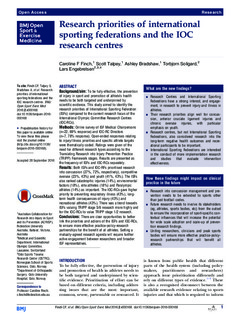| dc.contributor.author | Finch, Caroline F. | |
| dc.contributor.author | Talpey, Scott | |
| dc.contributor.author | Bradshaw, Ashley | |
| dc.contributor.author | Soligard, Torbjørn | |
| dc.contributor.author | Engebretsen, Lars | |
| dc.date.accessioned | 2017-02-15T10:13:45Z | |
| dc.date.available | 2017-02-15T10:13:45Z | |
| dc.date.issued | 2016 | |
| dc.identifier.citation | BMJ Open Sport & Exercise Medicine. 2016, 2. doi: 10.1136/bmjsem-2016-000168 | nb_NO |
| dc.identifier.uri | http://hdl.handle.net/11250/2430867 | |
| dc.description.abstract | BACKGROUND/AIM: To be fully effective, the prevention of injury in sport and promotion of athlete's health needs to be both targeted and underpinned by scientific evidence. This study aimed to identify the research priorities of International Sporting Federation (ISFs) compared to the current research focus of the International Olympic Committee Research Centres (IOC-RCs). METHODS: Online survey of ISF Medical Chairpersons (n=22, 69% response) and IOC-RC Directors (n=7, 78% response). Open-ended responses relating to injury/illness priorities and specific athlete targets were thematically coded. Ratings were given of the need for different research types according to the Translating Research into Injury Prevention Practice (TRIPP) Framework stages. Results are presented as the frequency of ISFs and IOC-RCs separately. RESULTS: Both ISFs and IOC-RFs prioritised research into concussion (27%, 72%, respectively), competitive overuse (23%, 43%) and youth (41%, 43%). The ISFs also ranked catastrophic injuries (14%), environmental factors (18%), elite athletes (18%) and Paralympic athletes (14%) as important. The IOC-RCs gave higher priority to preventing respiratory illness (43%), long-term health consequences of injury (43%) and recreational athletes (43%). There was a trend towards ISFs valuing TRIPP stage 5/6 research more highly and for the IOC-RCs to value TRIPP stage 1/2 research. CONCLUSIONS: There are clear opportunities to better link the priorities and actions of the ISFs and IOC-RCs, to ensure more effective practice-policy-research partnerships for the benefit of all athletes. Setting a mutually-agreed research agenda will require further active engagement between researchers and broader ISF representatives. | nb_NO |
| dc.language.iso | eng | nb_NO |
| dc.publisher | BMJ Journals | nb_NO |
| dc.subject | illness | nb_NO |
| dc.subject | research | nb_NO |
| dc.subject | sporting injuries | nb_NO |
| dc.subject | sporting organisation | nb_NO |
| dc.title | Research priorities of international sporting federations and the IOC research centres | nb_NO |
| dc.type | Journal article | nb_NO |
| dc.type | Peer reviewed | nb_NO |
| dc.subject.nsi | VDP::Medisinske Fag: 700::Idrettsmedisinske fag: 850 | nb_NO |
| dc.source.journal | BMJ Open Sport & Exercise Medicine | nb_NO |
| dc.identifier.doi | 10.1136/bmjsem-2016-000168 | |
| dc.description.localcode | Seksjon for idrettsmedisinske fag / Department of Sports Medicine | nb_NO |
